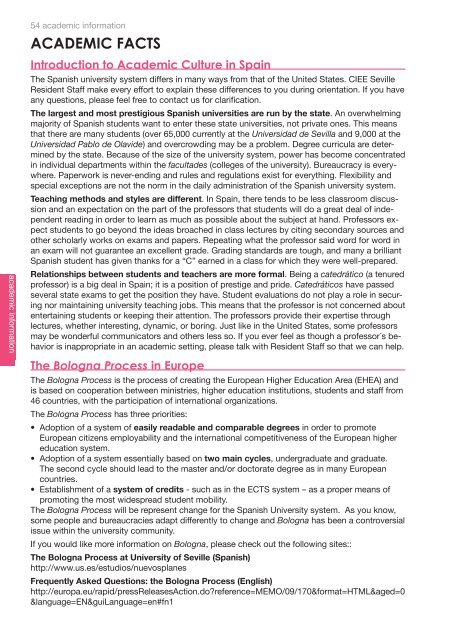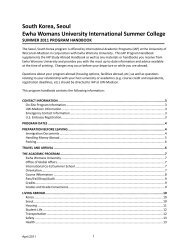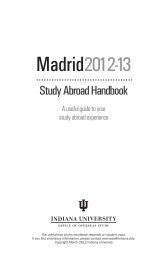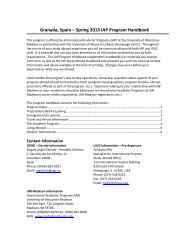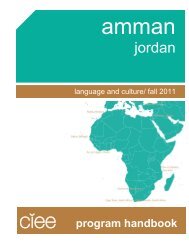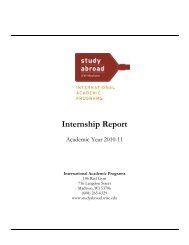teach in spain - UW Study Abroad
teach in spain - UW Study Abroad
teach in spain - UW Study Abroad
You also want an ePaper? Increase the reach of your titles
YUMPU automatically turns print PDFs into web optimized ePapers that Google loves.
academic <strong>in</strong>formation<br />
54 academic <strong>in</strong>formation<br />
ACADEMIC FACTS<br />
Introduction to Academic Culture <strong>in</strong> Spa<strong>in</strong><br />
The Spanish university system differs <strong>in</strong> many ways from that of the United States. CIEE Seville<br />
Resident Staff make every effort to expla<strong>in</strong> these differences to you dur<strong>in</strong>g orientation. If you have<br />
any questions, please feel free to contact us for clarification.<br />
The largest and most prestigious Spanish universities are run by the state. An overwhelm<strong>in</strong>g<br />
majority of Spanish students want to enter these state universities, not private ones. This means<br />
that there are many students (over 65,000 currently at the Universidad de Sevilla and 9,000 at the<br />
Universidad Pablo de Olavide) and overcrowd<strong>in</strong>g may be a problem. Degree curricula are determ<strong>in</strong>ed<br />
by the state. Because of the size of the university system, power has become concentrated<br />
<strong>in</strong> <strong>in</strong>dividual departments with<strong>in</strong> the facultades (colleges of the university). Bureaucracy is everywhere.<br />
Paperwork is never-end<strong>in</strong>g and rules and regulations exist for everyth<strong>in</strong>g. Flexibility and<br />
special exceptions are not the norm <strong>in</strong> the daily adm<strong>in</strong>istration of the Spanish university system.<br />
Teach<strong>in</strong>g methods and styles are different. In Spa<strong>in</strong>, there tends to be less classroom discussion<br />
and an expectation on the part of the professors that students will do a great deal of <strong>in</strong>dependent<br />
read<strong>in</strong>g <strong>in</strong> order to learn as much as possible about the subject at hand. Professors expect<br />
students to go beyond the ideas broached <strong>in</strong> class lectures by cit<strong>in</strong>g secondary sources and<br />
other scholarly works on exams and papers. Repeat<strong>in</strong>g what the professor said word for word <strong>in</strong><br />
an exam will not guarantee an excellent grade. Grad<strong>in</strong>g standards are tough, and many a brilliant<br />
Spanish student has given thanks for a “C” earned <strong>in</strong> a class for which they were well-prepared.<br />
Relationships between students and <strong>teach</strong>ers are more formal. Be<strong>in</strong>g a catedrático (a tenured<br />
professor) is a big deal <strong>in</strong> Spa<strong>in</strong>; it is a position of prestige and pride. Catedráticos have passed<br />
several state exams to get the position they have. Student evaluations do not play a role <strong>in</strong> secur<strong>in</strong>g<br />
nor ma<strong>in</strong>ta<strong>in</strong><strong>in</strong>g university <strong>teach</strong><strong>in</strong>g jobs. This means that the professor is not concerned about<br />
enterta<strong>in</strong><strong>in</strong>g students or keep<strong>in</strong>g their attention. The professors provide their expertise through<br />
lectures, whether <strong>in</strong>terest<strong>in</strong>g, dynamic, or bor<strong>in</strong>g. Just like <strong>in</strong> the United States, some professors<br />
may be wonderful communicators and others less so. If you ever feel as though a professor´s behavior<br />
is <strong>in</strong>appropriate <strong>in</strong> an academic sett<strong>in</strong>g, please talk with Resident Staff so that we can help.<br />
The Bologna Process <strong>in</strong> Europe<br />
The Bologna Process is the process of creat<strong>in</strong>g the European Higher Education Area (EHEA) and<br />
is based on cooperation between m<strong>in</strong>istries, higher education <strong>in</strong>stitutions, students and staff from<br />
46 countries, with the participation of <strong>in</strong>ternational organizations.<br />
The Bologna Process has three priorities:<br />
• Adoption of a system of easily readable and comparable degrees <strong>in</strong> order to promote<br />
European citizens employability and the <strong>in</strong>ternational competitiveness of the European higher<br />
education system.<br />
• Adoption of a system essentially based on two ma<strong>in</strong> cycles, undergraduate and graduate.<br />
The second cycle should lead to the master and/or doctorate degree as <strong>in</strong> many European<br />
countries.<br />
• Establishment of a system of credits - such as <strong>in</strong> the ECTS system – as a proper means of<br />
promot<strong>in</strong>g the most widespread student mobility.<br />
The Bologna Process will be represent change for the Spanish University system. As you know,<br />
some people and bureaucracies adapt differently to change and Bologna has been a controversial<br />
issue with<strong>in</strong> the university community.<br />
If you would like more <strong>in</strong>formation on Bologna, please check out the follow<strong>in</strong>g sites::<br />
The Bologna Process at University of Seville (Spanish)<br />
http://www.us.es/estudios/nuevosplanes<br />
Frequently Asked Questions: the Bologna Process (English)<br />
http://europa.eu/rapid/pressReleasesAction.do?reference=MEMO/09/170&format=HTML&aged=0<br />
&language=EN&guiLanguage=en#fn1


